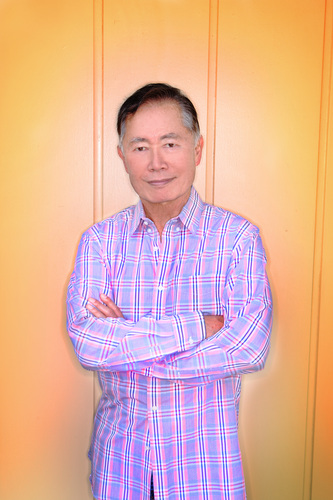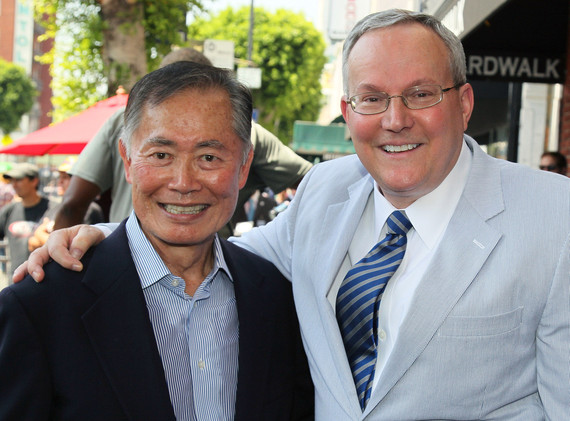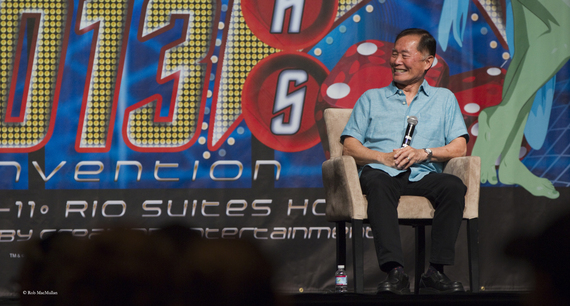By Brian D'Ambrosio
George Takei learned from his father that one could best get what one desired by expressing what they want rather than complaining about the way things are. From Takekuma Norman Takei, George also learned the usefulness of optimism in the face of confrontation.
The Takei family's soberest challenge was fixed in the World War II-era internment of Japanese-American citizens and families.
"My father was the one in the family who had suffered the most," said Takei, 77. "He had lost everything that he had worked so hard for. He was in his thirties, and he had a wife and three children. But he realized that we had to survive this."
The Takei family was sent to an Arkansas internment camp after the Japanese bombing of Pearl Harbor. George had just turned five. At the Rohwer War Relocation Center, in Rohwer, Arkansas, he remembers catching pollywogs in the creek and the sight of machine guns pointed at him from the sentry towers. Searchlights followed him when he made his runs to the latrine. Some in the camp were intensely depressed, even suicidal. In many cases they had been given just 48 hours to evacuate their homes. Refusing to be mastered by anger, Takekuma took a leadership position among the detainees.
"Since it was in the swamps, the old people couldn't make it to the latrine or to the mess hall three times a day," said Takei. "My father helped to build boardwalks with a group of other men. He was elected block manager -- basically a liaison with the block and the command. Tensions were high. Marriages were stained."
The Takei family was later transferred to the Tule Lake War Relocation Center, in northern California.
Takekuma never wasted time being angry about his internment. One has to get on in life, he told his family. People won't have time for you if you are always angry or complaining, he would say.
Father to Son: "We are made of fallible people"
Despite internment, Takekuma Takei retained a strong belief in the ideals of American democracy.
"As a teenager, I wanted to know more about our situation," said Takei.
We would have long and heated discussions after dinner with my father. He gave me that wisdom, and he explained our democracy. He said it was as great and fallible as the people are. He thought that democracy was dependent on good people who cherish our ideas. 'We are made up of fallible people,' he said. But when you compare our democracy to any other democracy on the planet, we stumble through as the best of them all.
Son George has gotten on with life -- and he hasn't done badly. Just count the six Star Trek movies, a long database of theater and television credits, political activism and his life as a social media celebrity.
"To Be Takei"
To Be Takei came from an idea by filmmaker Jennifer Kroot. Opening last week in theaters and VOD, it chronicles the actor's life at a time when he was relatively newly married to his partner Brad (though they are longtime partners.) He and Brad married in 2008.
"Brad was a little apprehensive at first when we were approached about the idea," said Takei. "But now he is reveling in it. Frankly, he steals the movie with his poker-face reaction to everything. He's the taller, and the more visible one, and people usually see him first and say, "Where's George?" And then they realize I am there and say, "oh, there he is."
For years, Takei lived a low-visibility life with Altman. The turning point came after California Gov. Arnold Schwarzenegger vetoed the state's same-sex marriage bill in 2005, prompting Takei to take a public position and become an observable LBGT advocate.
Takei first met Brad at a gay running club almost 28 years ago.
"Our first run was in Silver Lake," said Takei.
That's where the club was meeting one early evening. I had just started running, and he was one of the fastest, strongest runners in the group. He was handsome and muscled, and he seemed like a nice guy -- a trade journalist. He had run three marathons, I'd run none. He trained me and I finished my first marathon.
Dark Chapter
The documentary covers Allegiance, the musical about Japanese-American WWII camps that Takei starred in when it played in San Diego in 2012. By the time Allegiance closed, it had broken the Old Globe Theatre's 77-year record for box office and attendance.
Takei said the musical was an instinctive extension of his mission to continue to speak publicly about his time at a Japanese-American internment camp during World War II.
"It's been my lifetime mission to raise an awareness of that dark chapter of American history," said Takei, who serves on the board of the Japanese American National Museum.
"The best way to get people to connect with an issue is to humanize it. You can do so much more powerfully with music, and touch the heart."
History 101 with George Takei
A conversation with George Takei is a lovely endeavor steeped in his curiosity of storytelling and history. Takei is drawn to historical figures both legendary and unheralded. He finds the alcoves of American history fascinating. First there are a few words about Leonard Matlovich, the first to volunteer to fight the military's ban on gays.
"He was one of the early people who got fired from the military," said Takei. "He became an active and vocal activist in the military and the rescinding of 'don't ask, don't tell."
He chides Earl Warren, three-time governor of California and later the 14th Chief Justice of the United States, for exploiting the issue of Japanese-American loyalty for his own political expediency.
"He was an ambitious man and he sounded the drum beat," said Takei. "He saw the internment issue as a popular issue, and he ran for governor on that plank, and he won. Few people know about his dark past. The thing is that he knew all about the constitution. He knew that people were being held without charges or trials or without due process."
Then the conversation steers to a few sentences of admiration for Ralph Carr, Republican Governor of Colorado from 1939 to 1943.
"Carr was the only elected official at the time to say it (the internment) was wrong," said Takei. "And because of it his political career was ruined. He faded into history."
Perhaps it's not surprising that as a young man Takei found himself at Adlai Stevenson's presidential campaign headquarters in 1960, where he met Eugene McCarthy and Eleanor Roosevelt. (Stevenson, a two-time Democratic presidential nominee in 1952 and 1956, could not secure the party nomination a third time.)
"That was a heavy experience," said Takei. "Meeting luminaries. Leafleting. Talking to people. I remember Stevenson's ringing words, his shining ideals. He made the ideals of America so beautifully clear to me."
Those ideals don't always have a clean face. There is dirt and blemishes and at times a much needed bowl of clear water.
Born in 1937 in Los Angeles, Takei had just turned 5 when soldiers with bayonets on their rifles took his family from their home in 1942. Almost immediately after the December 7, 1941, attack on the U.S. naval base at Pearl Harbor, the allegiance of all those of Japanese descent living in America, regardless of their citizenship status, was called into question. On February 19th 1942 Roosevelt signed Executive Order 9066. Under the conditions of the Order, some 120,000 people of Japanese descent living in the US were removed from their homes and placed in internment camps.
When the Takei family arrived from Los Angeles to Arkansas, the barbed-wire fence and the bayonets were part of the landscape. More than two thirds of those interned total were American citizens and half of them were children. He was almost 9 when they got out.
"There were 10 internment camps for innocent Japanese-Americans who looked like the folks who bombed Pearl Harbor. There were two in Arkansas, two in the blistering parts of Arizona. There were two in the desolate parts of California.
Japanese citizens were labeled as alien non-agents. They, ironically, were handed a loyalty questionnaire by a country that had taken everything and that had put them in prison camps. And the questionnaire asked, 'Will you swear loyalty to us and forswear loyalty to the emperor of Japan?' This was offensive. After all, my mom was born in Sacramento and my dad was a San Franciscan. The question was a no-win situation, because if you answered yes it was if you were disloyal, and if you answered no it was if you were fessing up to being disloyal and needed to somehow re-pledge.
The War Department, in need of manpower, changed its attitude about keeping Japanese-Americans out of combat and sent recruiters to the internment camps, seeking volunteers to cast a new Japanese-American combat unit, the 442nd Regiment, in 1943.
"Just one year in, there was a war-time manpower shortage, and they went from barbed wire fences and into a segregated unit," said Takei.
"They sustained the highest casualty rate of any unit. And they were the single most decorated of all the units in WWII (and military history). Harry Truman said to them, 'you fought the enemy and prejudice and you won.' They took their businesses, their homes and their freedom, but not their dignity."
In 2011, in a ceremony in the U.S. Capitol, more than 19,000 Japanese Americans who served during World War II were awarded the nation's highest civilian honor, the Congressional Gold Medal.
Live in the Wonderful Present
Though Takei is a student of history, he doesn't cling to things or project too far ahead. He realizes that when we chase after a distant happiness, life becomes but a shadow of the reality. Takei's mind isn't occupied by the past or worrying about this or that in the future. He considers of true value the precious gifts of life which are already in his hands.
He is no longer an aspiring young actor or the self-admitted playboy he once was. At 77 years old, he is still letting it all merge and transition and flow naturally, drawing new energy from new projects.
"It's a continuum," said Takei. "I'm optimistic and I have a lot of goals. And I obey the laws of nature: I eat, exercise and rest properly. But mostly it's about keeping the mind engaged. My grandmother lived to 104, and she had all of her faculties. I'm physically active and devout -- just not as Buddhistic as she was."
Though it's been many years since Takei acted in his last Star Trek movie, he still attends conventions. He realizes that he will always be best known for his role as Hikaru Sulu in the original Star Trek TV series as well as in six Star Trek feature films.
"It will be written on my tombstone in very large letters," said Takei. "Here lies "Hikaru Sulu" and in very tiny letters, aka "George Takei." I don't protest the inevitable."
Gratitude unlocks the fullness of life. It turns denial into acceptance, selfishness into generosity and the tide of life into the tide of peace. It too turns a pop culture icon into one fulfilled documentary subject.
"So strange that tonight I am going to the premier of a biographical documentary on me," said Takei. "To have this kind of tribute and honor -- people paying money to see the movie -- it is humbling."
Brian D'Ambrosio's latest book, "Life in the Trenches," offers 37 narratives and stories of modern day trench warriors -- including Stephen King's favorite folksinger (James McMurtry); a Greco-Roman wrestler and MMA forefather from the Midwest (Dan "The Beast" Severn); entertainment wrestlers so convincing as villains that they repeatedly put their own lives in danger (Ivan Koloff, "Rowdy" Roddy Piper).



